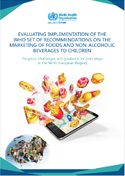Evaluating implementation of the WHO set of recommendations on the marketing of foods and non-alcoholic beverages to children. Progress, challenges and guidance for next steps in the WHO European Region (2018)

Download
A growing body of independent monitoring and research indicates that existing policies and regulations are markedly insufficient to address the continuing challenges in this field. Policies and regulations tend to use narrow definitions and criteria (they frequently apply to pre-digital media only, to younger children and not to adolescents, and to “child-directed” media, rather than those with the greatest child audiences), and they almost never address the complex challenges of crossborder marketing. This situation can be explained, in part, by the strong scrutiny and opposition that countries have faced from parts of the private sector, and by weak self-regulatory schemes. As a result, and in order to ensure that States uphold their legal obligations to protect the child’s right to health and related rights, the World Health Assembly has requested that WHO provides additional technical support to Member States in implementing the Set of Recommendations. This paper serves to describe the status of the implementation of the Set of Recommendations in countries across the WHO European Region. It also identifies loopholes, ongoing challenges, and factors that Member States need to consider in order to effectively limit the harmful impact that HFSS food marketing has on children, their health and their rights.



